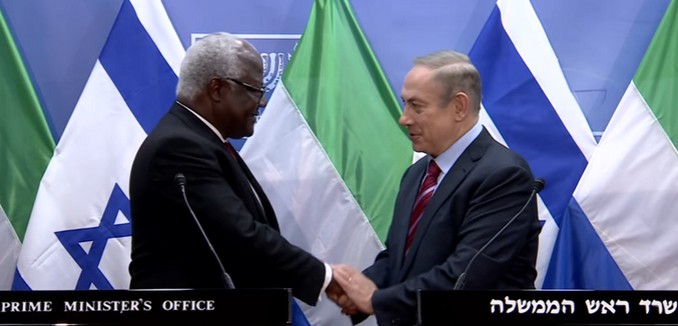On a state visit to Israel last week for the first time in his nation’s history, the president of the Muslim-majority West African nation of Sierra Leone expressed his gratitude to Israeli Prime Minister Benjamin Netanyahu and President Reuven Rivlin for the Jewish state’s assistance in fighting the Ebola virus.
“I must use this opportunity to thank you, the Government and the people of Israel, for the support that was provided to us during one of the most difficult moments in our history – the fight against Ebola,” President Ernest Bai Koroma said last Thursday at a joint appearance with Rivlin. “It was a moment others chose to turn their backs and isolate us, but Israel provided us with support, with financial, technical support, and we had people that volunteered to go out and assist us….That we have put the Ebola behind us is because of the support of this nation. Support that will always be remembered by Sierra Leoneans.”
“It is only a friend will support a friend that is in need,” Koroma added during his public meeting with Netanyahu. “And the Sierra Leonean people are most grateful for that.”
During the 2014 Ebola outbreak, Israel sent doctors and a field hospital to Sierra Leone to help the African nation fight the deadly disease and contributed $10 million to an aid fund—the sixth-largest contribution in the world. Fortunately, Netanyahu observed, “the most important thing is that you have contained this disease and you’re overcoming it, and we know what a great battle that was and what a burden it still is – the residual effects.”
Netanyahu met Koroma at an Israeli technology showcase at the United Nations headquarters in New York in September. The Prime Minister added that Israel saw the potential to build closer ties with Sierra Leone, especially “in agriculture, in water, the management of crops, the productivity of crops and many, many other areas.” He also praised Koroma for leading reconstruction and reconciliation after his country’s 1991-2002 civil war. “We want to part of that assistance, to help build Sierra Leone to a brighter and better future. This is something that you are leading and we’re more than ready to help Sierra Leone rebuild its country and build a future for its people,” Netanyahu pledged.
After expressing condolences over the four Israelis soldiers who were recently killed in a terror attack, Koroma noted that “Sierra Leone and Israel relations pre-date independence of both countries, and like many long-standing relationships, we have experienced some turbulence.” Israel began a foreign aid program in Sierra Leone in 1958, and Israeli architects designed and built the country’s parliament and other public buildings in the country’s capital, Freetown. But Sierra Leone, among many other African nations, cut off relations with Israel after the Yom Kippur War in 1973.
“But history has taught us that while we may remember, we may do well not to dwell on the dull moments, especially when the lights of the bright movements continue to sparkle,” Koroma said. He added that he looked forward to building closer ties to Israel, and extended an invitation to Netanyahu to visit Sierra Leone during Netanyahu’s his upcoming trip to West Africa. “I believe that both countries can work strongly together in the interest of both countries, in our efforts in repositioning our relationship as it was just about independence,” Koroma said.
Netanyahu, who also serves as foreign minister, has prioritized strengthening Israel’s commercial, diplomatic, and security relations with African countries. In addition to his UN technology summit, which was attended by at least 15 African heads of state and representatives, Netanyahu visited Uganda, Kenya, Rwanda, and Ethiopia this past summer, which was the first time in almost 30 years that an Israeli head of state visited sub-Saharan Africa. Weeks later, the Republic of Guinea, a Muslim-majority African nation, restored diplomatic ties with Israel after a 49-year break.
Israel has a long history of sharing its expertise with African countries, and Jerusalem hopes that stronger ties will lead to a shift in voting trends at the UN and other global fora, thus reversing what Netanyahu called “the automatic majority against Israel.”
Netanyahu observed in his address to the AIPAC Policy Conference in March that Israel has “diplomatic relations with 161 countries, more than at any time in our history.”
[Photo: IsraeliPM / YouTube ]




